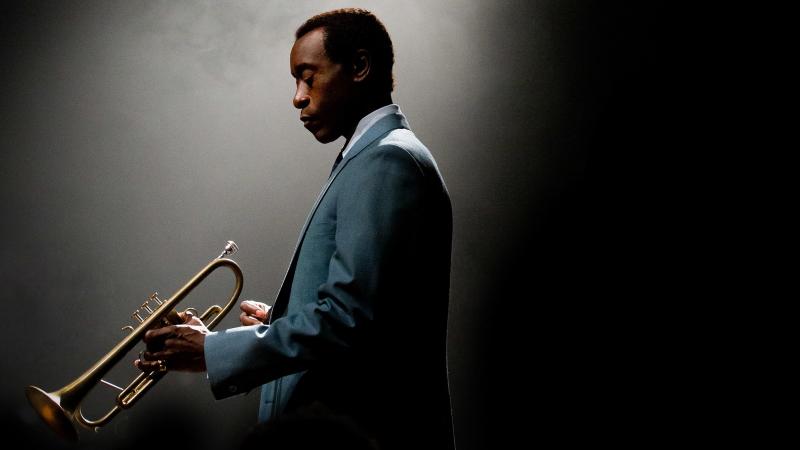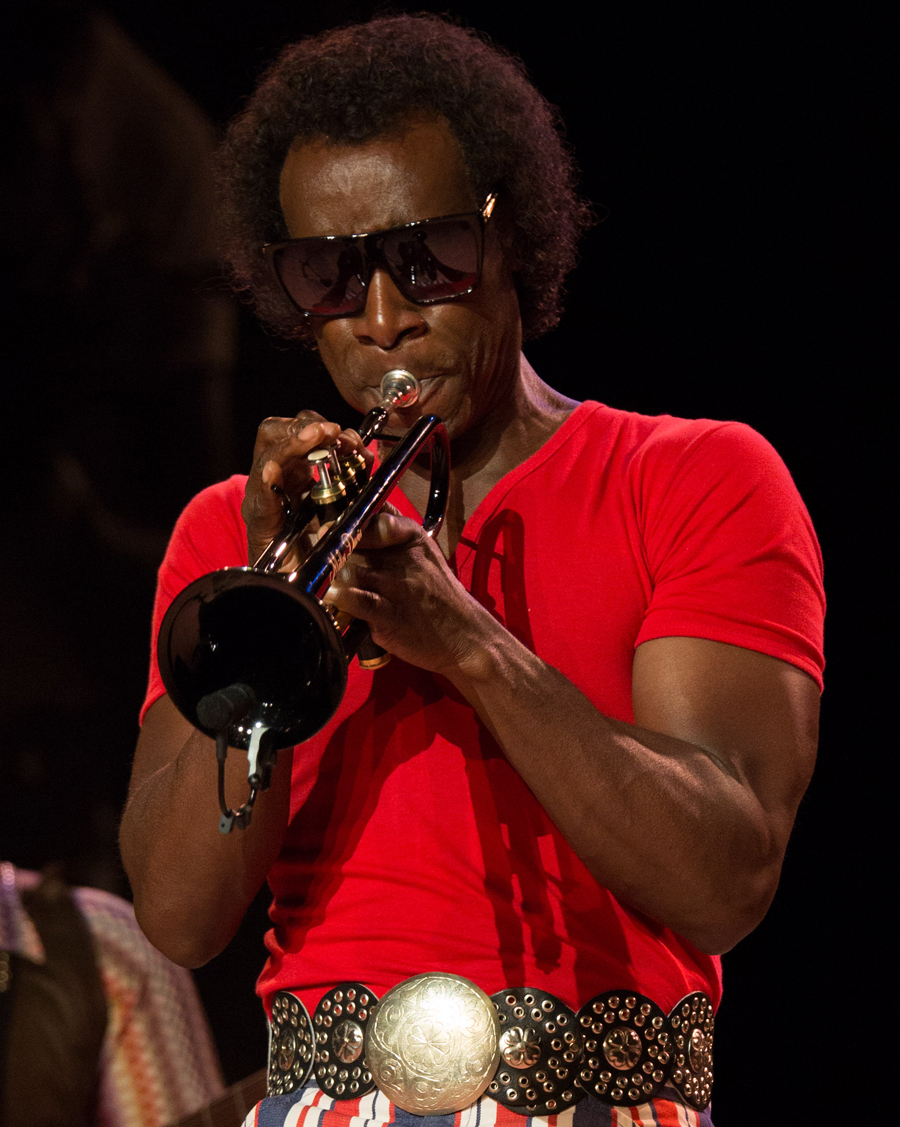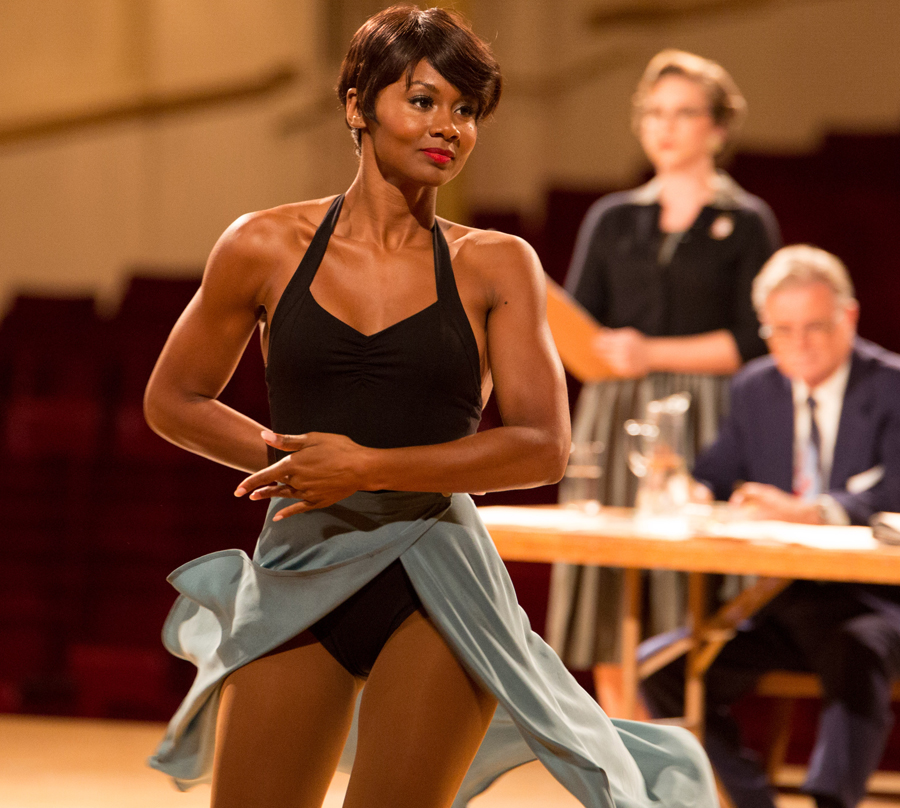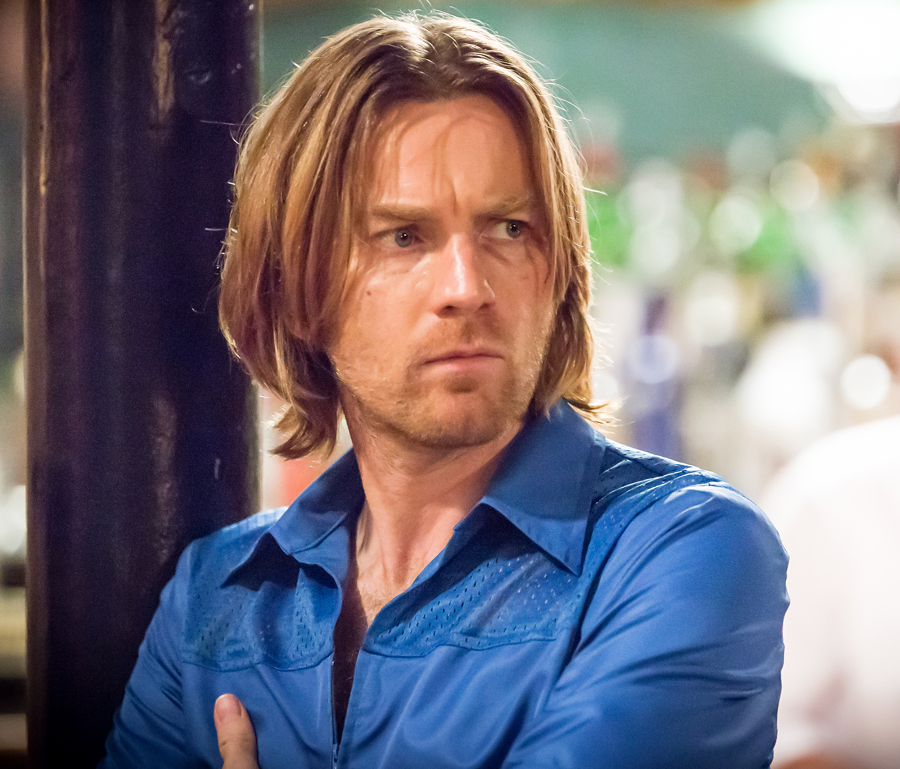Miles Ahead | reviews, news & interviews
Miles Ahead
Miles Ahead
Don Cheadle puts heart and soul into his portrayal of the man who transformed jazz

Catching the essence of the mercurial, secretive and notoriously abrasive Miles Davis on film might reasonably be described as a mission impossible, but Don Cheadle has put his heart and soul into it. He directed it and plays the title role, he co-wrote the screenplay with Steven Baigelman, and he put some of his own money into it. A jazz saxophonist since his youth, he took tips from Wynton Marsalis about playing the trumpet for the movie.
The results are both better and worse than you might have expected. Cheadle succeeds remarkably well at embodying Davis in the different periods in his career over which the timeline keeps jumping. The film initially clocks in at the end of the 1970s, when Davis was coming to the end of a long fallow period (which would eventually be broken by 1981's The Man with the Horn) and was living in a daze of sex, drugs and paranoia in his Upper West Side apartment. With his fizzy Afro hair, electric-dandy clothes and malevolent hissing speech, Cheadle perfectly nails this unkempt and chaotic incarnation of the jazz legend.
 One of the film's stylistic devices is to pause on an image and use it to transition to a matching shot at a different moment in time. For episodes depicting some of Davis's Fifties high points, Cheadle morphs smoothly into the groomed and tailored Davis of Miles Ahead or Kind of Blue. This was when Davis came closest to becoming a household name, not only acknowledged as a key shaper of post-World War Two jazz, but now also a fashionable name to drop with the white folks. Scenes of him working in the studio with arranger Gil Evans and a large jazz orchestra have been beautifully shot in rich period colours and impeccable attention to detail.
One of the film's stylistic devices is to pause on an image and use it to transition to a matching shot at a different moment in time. For episodes depicting some of Davis's Fifties high points, Cheadle morphs smoothly into the groomed and tailored Davis of Miles Ahead or Kind of Blue. This was when Davis came closest to becoming a household name, not only acknowledged as a key shaper of post-World War Two jazz, but now also a fashionable name to drop with the white folks. Scenes of him working in the studio with arranger Gil Evans and a large jazz orchestra have been beautifully shot in rich period colours and impeccable attention to detail.
But inevitably, racism and exploitation force their way into the foreground. Davis once commented, "If I woke up tomorrow and I was white, I'd kill myself," but he had reasonable grounds for his hostile attitude to the white world. The real-life episode from 1959 where Davis was beaten up by police and arrested while standing outside the Manhattan jazz club Birdland, where he was gigging with his band, is recreated here with indignation-evoking force.
 When Davis goes to watch his future wife and inspirational muse, Frances Taylor, auditioning for a dancing role, he can't help overhearing the mocking racist remarks of the white producers (Emayatzy Corinealdi as Frances, left). As for Miles's relationship with his record company, Columbia, he sees it as a form of slavery, the label demanding more product and claiming ownership of all his work while never showing Davis the respect he felt he'd earned. Mind you, plenty of white recording artists have felt exactly the same way.
When Davis goes to watch his future wife and inspirational muse, Frances Taylor, auditioning for a dancing role, he can't help overhearing the mocking racist remarks of the white producers (Emayatzy Corinealdi as Frances, left). As for Miles's relationship with his record company, Columbia, he sees it as a form of slavery, the label demanding more product and claiming ownership of all his work while never showing Davis the respect he felt he'd earned. Mind you, plenty of white recording artists have felt exactly the same way.
With so much life and work to use as raw material – and Cheadle doesn't pull any punches regarding Davis's violent and possessive attitude to women, with Frances feeling the full force – it's unfortunate that Cheadle felt it necessary to invent a completely fictional subplot starring a hustling freelance journalist, Dave Braden (Ewan McGregor, pictured below). Cheadle has admitted he needed a white co-star to boost international sales, but Braden has been shoehorned into the narrative with all the subtlety of the Statue of Liberty suddenly falling through the ceiling. He comes banging on Davis's door, claiming to have been hired to write his comeback story for Rolling Stone magazine. This guy is so pushy he even barges into the trumpeter's apartment and locks him out, tape-recording his impressions in tabloidesque drivel – "Jazz's Howard Hughes, reviled and revered..."
 Braden becomes Miles's barkingly implausible partner in crime, taking him down to the record company for a showdown where Miles pulls a gun, and assisting him in an absurd caper involving a tape of Davis's new music which has been stolen by an unscrupulous music-biz hustler called Harper Hamilton (Michael Stuhlbarg, in a caricature of smirking villainy). A late-night car chase where Davis gets shot in the leg by Hamilton's bodyguard is rubber-burningly dramatic, but it never happened to Miles Davis.
Braden becomes Miles's barkingly implausible partner in crime, taking him down to the record company for a showdown where Miles pulls a gun, and assisting him in an absurd caper involving a tape of Davis's new music which has been stolen by an unscrupulous music-biz hustler called Harper Hamilton (Michael Stuhlbarg, in a caricature of smirking villainy). A late-night car chase where Davis gets shot in the leg by Hamilton's bodyguard is rubber-burningly dramatic, but it never happened to Miles Davis.
See this movie for Cheadle's crackling performance and the musical content, not least a concluding comeback performance featuring the real Wayne Shorter and Herbie Hancock in Miles's band. Hats off to Cheadle for getting a film about Davis made at all. What a pity he had to make some glaringly obvious compromises to get it done.
Add comment
The future of Arts Journalism
You can stop theartsdesk.com closing!
We urgently need financing to survive. Our fundraising drive has thus far raised £49,000 but we need to reach £100,000 or we will be forced to close. Please contribute here: https://gofund.me/c3f6033d
And if you can forward this information to anyone who might assist, we’d be grateful.

Subscribe to theartsdesk.com
Thank you for continuing to read our work on theartsdesk.com. For unlimited access to every article in its entirety, including our archive of more than 15,000 pieces, we're asking for £5 per month or £40 per year. We feel it's a very good deal, and hope you do too.
To take a subscription now simply click here.
And if you're looking for that extra gift for a friend or family member, why not treat them to a theartsdesk.com gift subscription?
more Film
 London Film Festival - from paranoia in Brazil and Iran, to light relief in New York and Tuscany
'Jay Kelly' disappoints, 'It Was Just an Accident' doesn't
London Film Festival - from paranoia in Brazil and Iran, to light relief in New York and Tuscany
'Jay Kelly' disappoints, 'It Was Just an Accident' doesn't
 Iron Ladies review - working-class heroines of the Miners' Strike
Documentary salutes the staunch women who fought Thatcher's pit closures
Iron Ladies review - working-class heroines of the Miners' Strike
Documentary salutes the staunch women who fought Thatcher's pit closures
 Blu-ray: The Man in the White Suit
Ealing Studios' prescient black comedy, as sharp as ever
Blu-ray: The Man in the White Suit
Ealing Studios' prescient black comedy, as sharp as ever
 The Woman in Cabin 10 review - Scandi noir meets Agatha Christie on a superyacht
Reason goes overboard on a seagoing mystery thriller
The Woman in Cabin 10 review - Scandi noir meets Agatha Christie on a superyacht
Reason goes overboard on a seagoing mystery thriller
 London Film Festival 2025 - crime, punishment, pop stars and shrinks
Daniel Craig investigates, Jodie Foster speaks French and Colin Farrell has a gambling habit
London Film Festival 2025 - crime, punishment, pop stars and shrinks
Daniel Craig investigates, Jodie Foster speaks French and Colin Farrell has a gambling habit
 I Swear review - taking stock of Tourette's
A sharp and moving tale of cuss-words and tics
I Swear review - taking stock of Tourette's
A sharp and moving tale of cuss-words and tics
 A House of Dynamite review - the final countdown
Kathryn Bigelow's cautionary tale sets the nuclear clock ticking again
A House of Dynamite review - the final countdown
Kathryn Bigelow's cautionary tale sets the nuclear clock ticking again
 theartsdesk Q&A: Idris Elba on playing a US President faced with a missile crisis in 'A House of Dynamite'
The star talks about Presidential decision-making when millions of lives are imperilled
theartsdesk Q&A: Idris Elba on playing a US President faced with a missile crisis in 'A House of Dynamite'
The star talks about Presidential decision-making when millions of lives are imperilled
 Urchin review - superb homeless drama
Frank Dillane gives a star-making turn in Harris Dickinson’s impressive directorial debut
Urchin review - superb homeless drama
Frank Dillane gives a star-making turn in Harris Dickinson’s impressive directorial debut
 Mr Blake at Your Service review - John Malkovich in unlikely role as an English butler
Weird comedy directed by novelist Gilles Legardinier
Mr Blake at Your Service review - John Malkovich in unlikely role as an English butler
Weird comedy directed by novelist Gilles Legardinier
 Don't Let's Go to the Dogs Tonight review - vivid adaptation of a memoir about a Rhodesian childhood
Embeth Davidtz delivers an impressive directing debut and an exceptional child star
Don't Let's Go to the Dogs Tonight review - vivid adaptation of a memoir about a Rhodesian childhood
Embeth Davidtz delivers an impressive directing debut and an exceptional child star

Comments
I think your critism of
I think your critism of Cheadle's choice of a fictional subplot miss the point of the innovative way Don attempts to mimmick the abstract and emotive nature of Mile's music. I think its perfect and allows Don to take the narrative on a path that includes car chases and gunfights - it allows Miles Ahead to touch on controversal subject matter regarding Davis's life without having to outright state it as biographical fact. In short, it's an ingenious plot device. This film is much better than it's critical aclaim would have us believe (and the reviews are good). Go see it! Thanks for the review enjoyed reading.